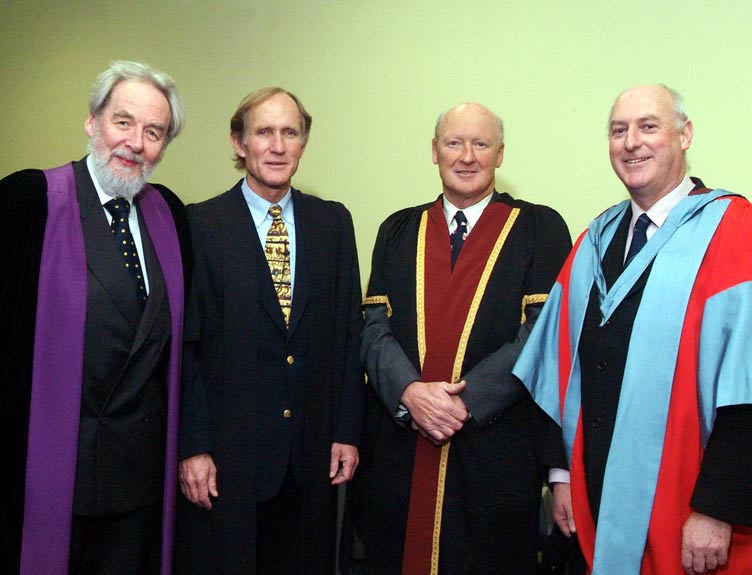2003 Nobel Prize winner speaks at RCSI on the impact of his research on chronic disease

The 3rd Annual Charitable Infirmary Charitable Trust (CICT) Lecture was given by Nobel Laureate Dr Peter Agre at RCSI on Wednesday, 19 April 2006.
Entitled 'Aquaporin Water Channels: from atomic structure to clinical medicine', Dr Agre spoke on how his Nobel prize winning discovery of the method in which water is transported in and out of cells in the body has lead to a much greater understanding of the molecular and genetic basis of chronic conditions such as diabetes insipidus, kidney failure, hypertension and oedema.
According to Dr Peter Conlon, Consultant Nephrologist and Renal Transplant Physician at Beaumont Hospital in Dublin Dr Agre has made some of the most important observations on the functioning of the human kidney in the last 100 years. His work has contributed to our understanding of how normal people make concentrated urine and to what happens when this system goes wrong. His discoveries, which were originally thought to apply to the kidney only, have now been demonstrated to be important to the normal functioning of many different systems in the brain and the eye.
Due to the relatively high osmotic permeability of some epithelial cells it was long suspected that some additional mechanism for water transport across the membrane must exist, but it was not until 1992 that Dr Agre discovered the first water channel, called an aquaporin, (a protein with a hole in it, which is the exact size of a water molecule, that functions as a water transportation system for cells in the body.
Aquaporins are therefore water channel proteins, which facilitate the transport of water across cell membranes. The structure of aquaporins is such that they fold together to form a water channel. Computer simulations have suggested that the orientation of water molecules moving through the channel and the dimensions of the channel pore assures that only water passes through the channel. These pioneering discoveries and research into water channels by Peter Agre were rewarded by the Nobel Prize for Chemistry in 2003.
Dr Peter Agre and his team discovered the very first aquaporin protein in 1992 and the gene that codes the message for it production in cells. Since then, ten more aquaporin sub-types and related genes have been found in mammals, and hundreds more in plants and bacteria. Aquaporins have been associated with critical water transport in skeletal muscle, lung and kidney and members of Agre's team have also found aquaporins in the eye, and in salivary and tear glands. Dr Agre and his team discovered that the type of aquaporin and its expression in a particular organ determines its function. For example Aquaporin 1 and 2 (Aqp 1 and Aqp 2) are found in the kidney while Aqp 4 exists in the sweat glands and each is responsible for regulating water transport in these tissues.
Dr Agre's discovery was of crucial importance to the further understanding of how the human body regulates its water balance. However, what proved to be of even greater importance was its potential to provide a molecular and genetic target to treat a number of common chronic diseases.
The Norwegian doctor found that when this critical system of water transportation becomes defective or its gene is mutated, it results in a number of chronic conditions such as diabetes insipidus, hypertension, oedema and kidney disease.
This breakthrough gave scientists the ability to develop novel therapies to block the aquaporin water channel by making the cell membrane impenetrable to water, thus regulating the movement of water throughout the body.
It has also allowed scientists to pinpoint the gene responsible for the defective aquaporin and develop methods of screening family members to determine their predisposition to disease. This can also lead to life saving treatments such as interventions with fluid or salt handling.
Most of the aetiology of hypertension is multi factorial but a major role is played by the reabsorbtion of too much water by the kidney. The majority of drugs used to treat hypertension today target the kidney so it loses excess water from the body resulting in a successful treatment for the condition.
The CICT was established with the proceeds of the sale of the Charitable Infirmary in Jervis Street, which closed its doors in 1987 after 250 years. With the closure of the Infirmary its staff moved to Beaumont Hospital where the Charitable Infirmary lives on through the Trust's sponsorship of the RCSI Charitable Infirmary Trust Molecular Medicine Laboratories under the direction of Professor Brian Harvey. Opened in 2002, the Charitable Infirmary Trust Molecular Medicine Laboratories are based in the Smurfit Building, Education and Research Centre, Beaumont Hospital.
Since the opening of Beaumont Hospital the CICT has donated over 3 million to medical research and teaching projects in the hospital and the RCSI. The RCSI Molecular Medicine Laboratory is a key contributor to the development of the Dublin Molecular Medicine Centre (DMMC), which is also supported by Trinity College Dublin and University College Dublin.
Dr Agre also delivered a lecture in Beaumont Hospital's Robert Adams lecture theatre at 12.30 pm on Thursday April 20th. This was simultaneously broadcast to Letterkenny Regional hospital, Cork University Hospital, Waterford Regional Hospital, Limerick Regional Hospital, Merlin Park Hospital Galway and Cavan General Hospital.



